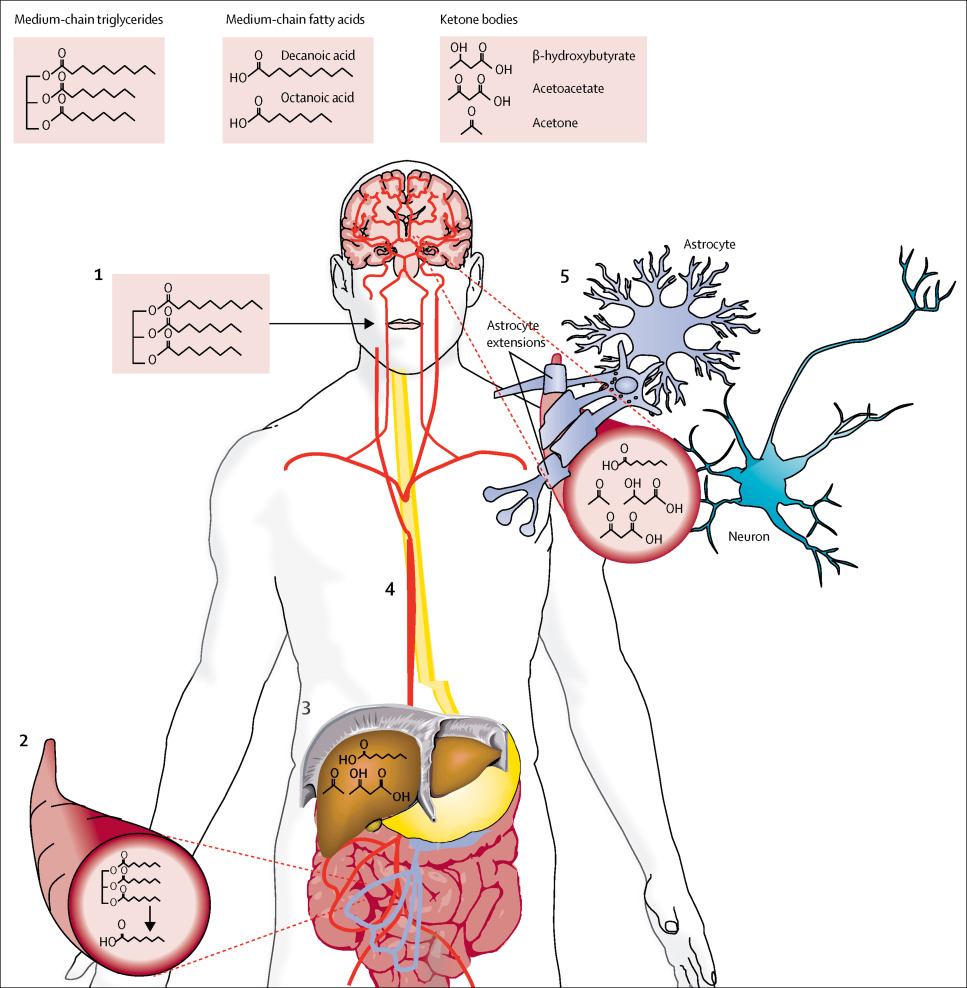Our official English website, www.x-mol.net, welcomes your
feedback! (Note: you will need to create a separate account there.)
Mechanisms of action for the medium-chain triglyceride ketogenic diet in neurological and metabolic disorders.
The Lancet ( IF 98.4 ) Pub Date : 2018-01-01 , DOI: 10.1016/s1474-4422(17)30408-8 Katrin Augustin 1 , Aziza Khabbush 2 , Sophie Williams 3 , Simon Eaton 2 , Michael Orford 2 , J Helen Cross 4 , Simon J R Heales 2 , Matthew C Walker 3 , Robin S B Williams 1
The Lancet ( IF 98.4 ) Pub Date : 2018-01-01 , DOI: 10.1016/s1474-4422(17)30408-8 Katrin Augustin 1 , Aziza Khabbush 2 , Sophie Williams 3 , Simon Eaton 2 , Michael Orford 2 , J Helen Cross 4 , Simon J R Heales 2 , Matthew C Walker 3 , Robin S B Williams 1
Affiliation

|
High-fat, low-carbohydrate diets, known as ketogenic diets, have been used as a non-pharmacological treatment for refractory epilepsy. A key mechanism of this treatment is thought to be the generation of ketones, which provide brain cells (neurons and astrocytes) with an energy source that is more efficient than glucose, resulting in beneficial downstream metabolic changes, such as increasing adenosine levels, which might have effects on seizure control. However, some studies have challenged the central role of ketones because medium-chain fatty acids, which are part of a commonly used variation of the diet (the medium-chain triglyceride ketogenic diet), have been shown to directly inhibit AMPA receptors (glutamate receptors), and to change cell energetics through mitochondrial biogenesis. Through these mechanisms, medium-chain fatty acids rather than ketones are likely to block seizure onset and raise seizure threshold. The mechanisms underlying the ketogenic diet might also have roles in other disorders, such as preventing neurodegeneration in Alzheimer's disease, the proliferation and spread of cancer, and insulin resistance in type 2 diabetes. Analysing medium-chain fatty acids in future ketogenic diet studies will provide further insights into their importance in modified forms of the diet. Moreover, the results of these studies could facilitate the development of new pharmacological and dietary therapies for epilepsy and other disorders.
中文翻译:

中链甘油三酯生酮饮食在神经和代谢紊乱中的作用机制。
高脂肪、低碳水化合物饮食,称为生酮饮食,已被用作难治性癫痫的非药物治疗。这种治疗的一个关键机制被认为是酮的产生,它为脑细胞(神经元和星形胶质细胞)提供比葡萄糖更有效的能量来源,导致有益的下游代谢变化,例如增加腺苷水平,这可能对发作控制有影响。然而,一些研究挑战了酮的核心作用,因为中链脂肪酸是一种常用的饮食变化(中链甘油三酯生酮饮食)的一部分,已被证明可以直接抑制 AMPA 受体(谷氨酸受体),并通过线粒体生物合成改变细胞能量学。通过这些机制,中链脂肪酸而不是酮类可能会阻止癫痫发作并提高癫痫发作阈值。生酮饮食的潜在机制也可能在其他疾病中发挥作用,例如预防阿尔茨海默病中的神经变性、癌症的增殖和扩散以及 2 型糖尿病中的胰岛素抵抗。在未来的生酮饮食研究中分析中链脂肪酸将进一步深入了解它们在改良饮食形式中的重要性。此外,这些研究的结果可以促进针对癫痫和其他疾病的新药理学和饮食疗法的开发。例如预防阿尔茨海默病的神经变性、癌症的增殖和扩散以及 2 型糖尿病的胰岛素抵抗。在未来的生酮饮食研究中分析中链脂肪酸将进一步深入了解它们在改良饮食形式中的重要性。此外,这些研究的结果可以促进针对癫痫和其他疾病的新药理学和饮食疗法的开发。例如预防阿尔茨海默病的神经变性、癌症的增殖和扩散以及 2 型糖尿病的胰岛素抵抗。在未来的生酮饮食研究中分析中链脂肪酸将进一步深入了解它们在改良饮食形式中的重要性。此外,这些研究的结果可以促进针对癫痫和其他疾病的新药理学和饮食疗法的开发。
更新日期:2017-12-16
中文翻译:

中链甘油三酯生酮饮食在神经和代谢紊乱中的作用机制。
高脂肪、低碳水化合物饮食,称为生酮饮食,已被用作难治性癫痫的非药物治疗。这种治疗的一个关键机制被认为是酮的产生,它为脑细胞(神经元和星形胶质细胞)提供比葡萄糖更有效的能量来源,导致有益的下游代谢变化,例如增加腺苷水平,这可能对发作控制有影响。然而,一些研究挑战了酮的核心作用,因为中链脂肪酸是一种常用的饮食变化(中链甘油三酯生酮饮食)的一部分,已被证明可以直接抑制 AMPA 受体(谷氨酸受体),并通过线粒体生物合成改变细胞能量学。通过这些机制,中链脂肪酸而不是酮类可能会阻止癫痫发作并提高癫痫发作阈值。生酮饮食的潜在机制也可能在其他疾病中发挥作用,例如预防阿尔茨海默病中的神经变性、癌症的增殖和扩散以及 2 型糖尿病中的胰岛素抵抗。在未来的生酮饮食研究中分析中链脂肪酸将进一步深入了解它们在改良饮食形式中的重要性。此外,这些研究的结果可以促进针对癫痫和其他疾病的新药理学和饮食疗法的开发。例如预防阿尔茨海默病的神经变性、癌症的增殖和扩散以及 2 型糖尿病的胰岛素抵抗。在未来的生酮饮食研究中分析中链脂肪酸将进一步深入了解它们在改良饮食形式中的重要性。此外,这些研究的结果可以促进针对癫痫和其他疾病的新药理学和饮食疗法的开发。例如预防阿尔茨海默病的神经变性、癌症的增殖和扩散以及 2 型糖尿病的胰岛素抵抗。在未来的生酮饮食研究中分析中链脂肪酸将进一步深入了解它们在改良饮食形式中的重要性。此外,这些研究的结果可以促进针对癫痫和其他疾病的新药理学和饮食疗法的开发。











































 京公网安备 11010802027423号
京公网安备 11010802027423号